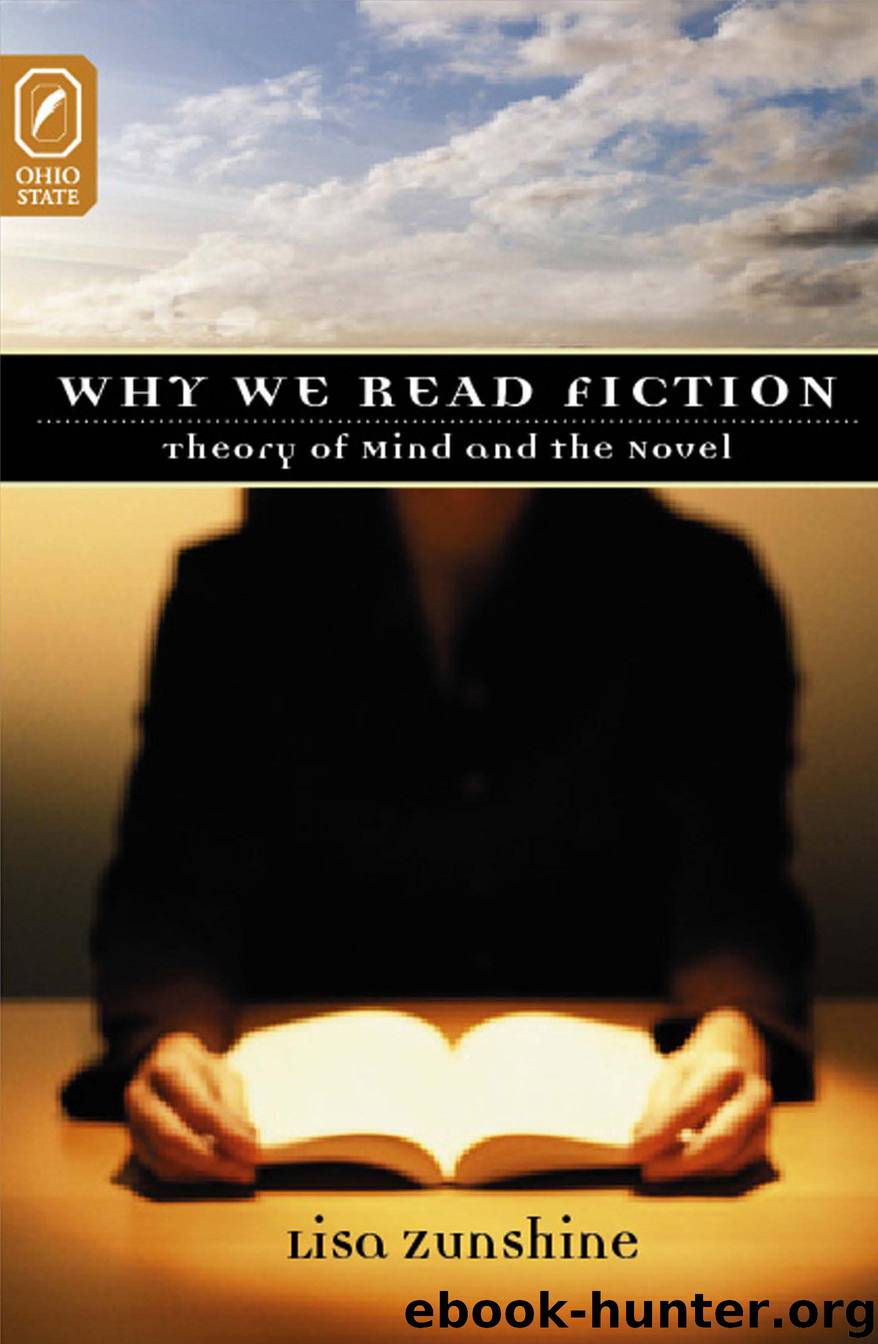Why We Read Fiction: Theory of Mind and the Novel by Lisa Zunshine

Author:Lisa Zunshine
Language: eng
Format: mobi
Tags: Science
ISBN: 9780814210284
Publisher: Ohio State University Press
Published: 2006-03-22T10:00:00+00:00
FIGURE 2. Clarissa dying. Reproduced courtesy of McMaster University Library.
(a) Mind-Games in Clarissa
Clarissa is a story of two brilliant young people, Clarissa Harlowe and Robert Lovelace, fatally misreading each other's minds in the course of their deeply troubled courtship. Lovelace, a paradigmatic eighteenth-century "rake," committed to seducing and subsequently abandoning incautious virgins, and Clarissa, a paragon of beauty, piety, and foresight, live out the eighteenth-century version of the "ultimate challenge": will Clarissa convert Lovelace to her exalted system of values and prove that "the reformed rake makes the best husband," or will Lovelace sweet-talk, cheat, and intimidate Clarissa into cohabitation without marriage, his "darling scheme" and his sign of "triumph" over the whole female sex and their pretensions to "virtue"?
Structured as a series of epistolary exchanges between Clarissa and her confidante, Anna Howe, Lovelace and his confidante, John Belford, and the occasional letters from and to their respective families, the novel is simultaneously claustrophobic and boundless. The protagonists are mostly confined to their writing-desks, reporting to their respective friends in painstaking detail their endeavors to guess, second-guess, plant, anticipate, and interpret each other's thoughts. The outcome of this obsessive mind-reading is such that Clarissa and Lovelace stop communicating altogether and die, or, rather, commit what could be considered thinly veiled acts of suicide. Clarissa wills herself to die (figure 2), possibly out of commitment to her developing view of herself as a tragic heroine—indeed, a martyr—who moves inexorably toward her terrible and instructive end,2 possibly from depression induced by Lovelace's manipulation of her reality, a manipulation that makes her feel that none of the mainstays of her moral world—familial love, compassion of the strong for the weak, communal ties—can survive when confronted with playful but determined evil. Lovelace dies because he came to be so emotionally invested in her that he cannot go on after she passes away.
Before I turn to examining Richardson's experimentation with our metarepresentational capacity, let me make a point that may sound like old news to you by now. This point, however, cannot be repeated often enough in a book that hopes to put the cognitive-evolutionary concept of the Theory of Mind on the map of contemporary literary studies. Clarissa and Lovelace may be preternaturally adept at planning and deflecting each other's mental gambits, an intellectual one-upmanship that marks them as exceptional among other characters in the novel and justifies the appellations of "genius" generously bestowed upon them throughout the narrative. And yet the truly amazing and sustained feat of mind-reading takes place not when Clarissa "sees through" Lovelace's new contrivance or when Lovelace anticipates her seeing through it and prepares a plan B. It takes place when we as readers of Richardson's novel attribute the generous capacity for thoughts and desires to each fictional character, however tenuously delineated, and then proceed to interpret his or her behavior in terms of his or her underlying mental world, supplying a myriad of absent
10: Richardon's Clarissa
links, assumptions, and tacit explanations that allow us to see the story as a rich and emotionally coherent whole.
Download
This site does not store any files on its server. We only index and link to content provided by other sites. Please contact the content providers to delete copyright contents if any and email us, we'll remove relevant links or contents immediately.
| Booksellers & Bookselling | General |
| History of Books |
4 3 2 1: A Novel by Paul Auster(12354)
The handmaid's tale by Margaret Atwood(7727)
Giovanni's Room by James Baldwin(7297)
Asking the Right Questions: A Guide to Critical Thinking by M. Neil Browne & Stuart M. Keeley(5736)
Big Magic: Creative Living Beyond Fear by Elizabeth Gilbert(5721)
Ego Is the Enemy by Ryan Holiday(5390)
The Body: A Guide for Occupants by Bill Bryson(5064)
On Writing A Memoir of the Craft by Stephen King(4910)
Ken Follett - World without end by Ken Follett(4705)
Adulting by Kelly Williams Brown(4550)
Bluets by Maggie Nelson(4534)
Eat That Frog! by Brian Tracy(4497)
Guilty Pleasures by Laurell K Hamilton(4418)
The Poetry of Pablo Neruda by Pablo Neruda(4079)
Alive: The Story of the Andes Survivors by Piers Paul Read(4009)
White Noise - A Novel by Don DeLillo(3988)
Fingerprints of the Gods by Graham Hancock(3978)
The Book of Joy by Dalai Lama(3958)
The Bookshop by Penelope Fitzgerald(3827)
